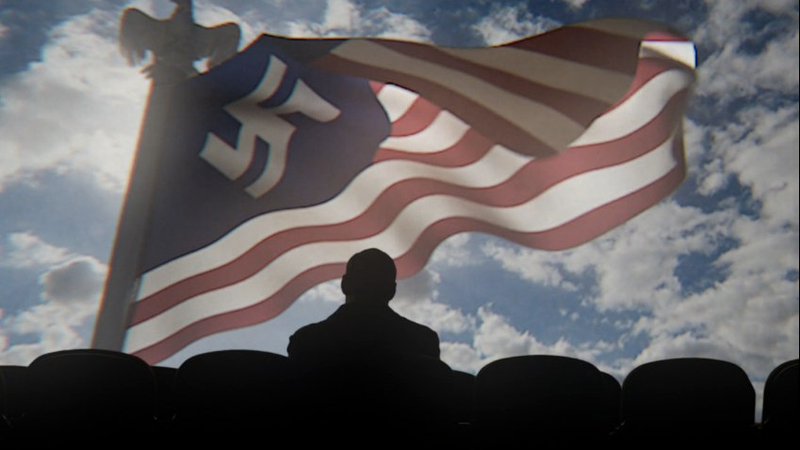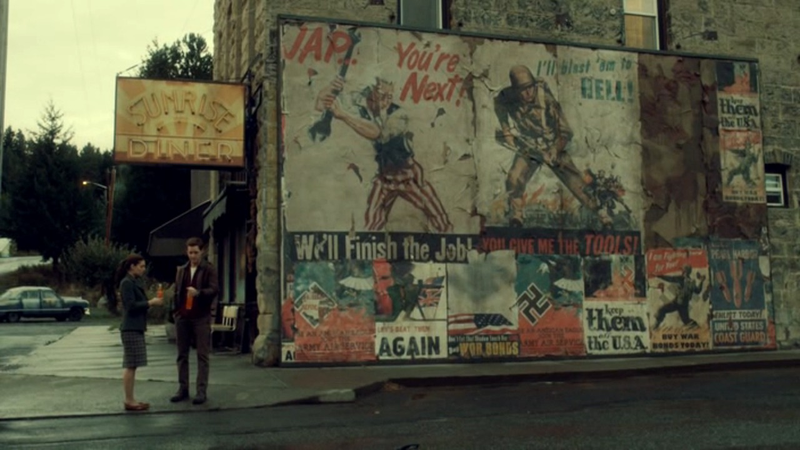theworldismine13
God Emperor of SOHH
The Man In The High Castle Is This Year's Most Political Show, And What It Reveals Is Frightening
The Man In The High Castle Is This Year's Most Political Show, And What It Reveals Is Frightening
The Man In The High Castle Is This Year's Most Political Show, And What It Reveals Is Frightening
When Amazon.com dropped the pilot for their adaptation of Philip K. dikk’s The Man in the High Castle, expectations ran high. The first episode was stunning, and the second episode was just as good. Now, the rest of the season explores just how fascism becomes engrained in a society.
Some minor spoilers for the show’s first season.
The basic premise of The Man in the High Castle is a classic alternate history trope: what happens if the allies lose World War II? Here, Germany takes over the eastern half of the United States, while Japan takes up the Western coast: only a small sliver in the middle divides the two.
Germany has come out of the Second World War riding high: they’re technologically advanced, and maintain a tight grip on the world, while Japan struggles to keep up. While they were allies during the war, they now live in an uneasy sort of Cold War, and as the Nazi Party’s leaders are getting old, tensions are rising.
12
It should be noted that this isn’t a literal adaptation of Philip K. dikk’s novel: the show’s producers had to change up parts of the story, including adding in elements of an American resistance to the occupying forces. I’ve been reading up on the book, and it’s interesting to see the differences here: Juliana Frink has become Juliana Crain, while Joe Cinnadella has become Joe Blake. Additionally, the fictional book that portrays an alternate world, The Grasshopper Lies Heavy, has become a series of new reels.
While those changes are a bit more superficial, the novel and the TV show are both pretty different entities. The best comparison that I can think of is how Philip K. dikk’s other stories have been adapted, such as Do Androids Dream of Electric Sheep? (Blade Runner), and Minority Report, which sees television and movie productions taking dikk’s ideas and running with them. The end result is that you end up with a very different sort of production than the original source material. Man in the High Castle is pretty much par for the course by that standard.
That’s not a bad thing: Minority Report (the film - I haven’t seen the TV Show) and Blade Runner were both excellent films.

It’s a Freaking Miracle That We Got a Man in the High Castle TV Show
The producers of the Man in the High Castle TV series spent eight years trying to get it off the… Read more
My running theory with Philip K. dikk’s work is that the scenarios that he’s come up with are really great for the visual medium, while the stories don’t translate as well. Minority Report the story was a really interesting take on the divide in mission between the military and the police, while the movie was more about the trust the public has in the judicial system. In Man in the High Castle, dikk focuses on the idea that life is a forgery - that existence is based on something else. In the television show, the producers take a more political track: how does fascism become rooted in a country?

There’s also quite a bit of the book still remaining in the show: many of the characters hold onto the same roles and places, but there’s more of an inter-connected sense to everyone. Juliana and Joe meet one another in Canon City, where they come up against a bounty hunter, all the while they’re trying to each figure out what to do with the copies of The Grasshopper Lies Heavy that they’re carrying: Juliana is trying to find out what happened with her step sister, while Joe is on a mission on behalf of the Nazi Party.
Despite the differences, the show is a stunning one, and the subject matter is fantastic for television. There’s little differences between our world and this fascist alternate world: street signs, vehicles, the swastika on the American flag, and so forth. There’s a certain pornographic tendency towards alternative histories: what can you point out that’s different between our world and the next? Philip K. dikk’s novel does an excellent job with this, dropping in little hints here and there.
There’s a sense of gratuitous storytelling here: Juliana and Joe’s encounter with The Marshal feels like it’s been tacked on, to show off a bit more of the world, while not really advancing the plot all that much, while the death of Frank’s sister and her children seems to exists only motivate him and show off the brutality of the Japanese regime. It takes several episodes before the show really starts to pick up the pace. They’re great episodes to be sure, but you can certainly tell where they’re trying to establish and define the world.
The real focus in the show seems to be around how people seem to accept the brutality around them. There’s a really powerful moment when Joe heads to New York and is invited to Obergruppenführer John Smith’s home for VA day - Victory over America. Everything seems so normal, despite the fact that there’s swastikas everywhere and neighbors greet one another with a Nazi salute. It’s unsettling, because it seems so casual.
The show seems to make a certain point: people will largely go along with their government and leadership simply because that’s what’s done - if the health of the resistance movement is of any indication, there’s a lot of simply going with the flow here - people pretty much brush off what the Nazis do: they explain away the ash falling from the sky from a nearby hospital, where those who are a burden on the state are disposed of, while people seem to have casually ignored the mass extermination of Jews in the country. There’s plenty of historical evidence to support this, particularly with towns near concentration camps in Germany during the Second World War.
It might be reading a little too deeply into this, but this is a story that needs to be taken in, and The Man in the High Castle really drives home some important points. Given all that’s happening in the world now, from rising immigrant and anti-Islamic rhetoric, people as a whole are willing to do terrible things when their country’s political leaders point the finger. Amazon’s show isn’t a reaction to this, but it’s timing is impeccable.
Ultimately, The Man In The High Castle is about the limits that people will endure in the name of peace and security, but also makes a point that it’s human nature to go along with what everyone else is doing. The end result is a stunning series that’s engaging, exciting and thought provoking.
